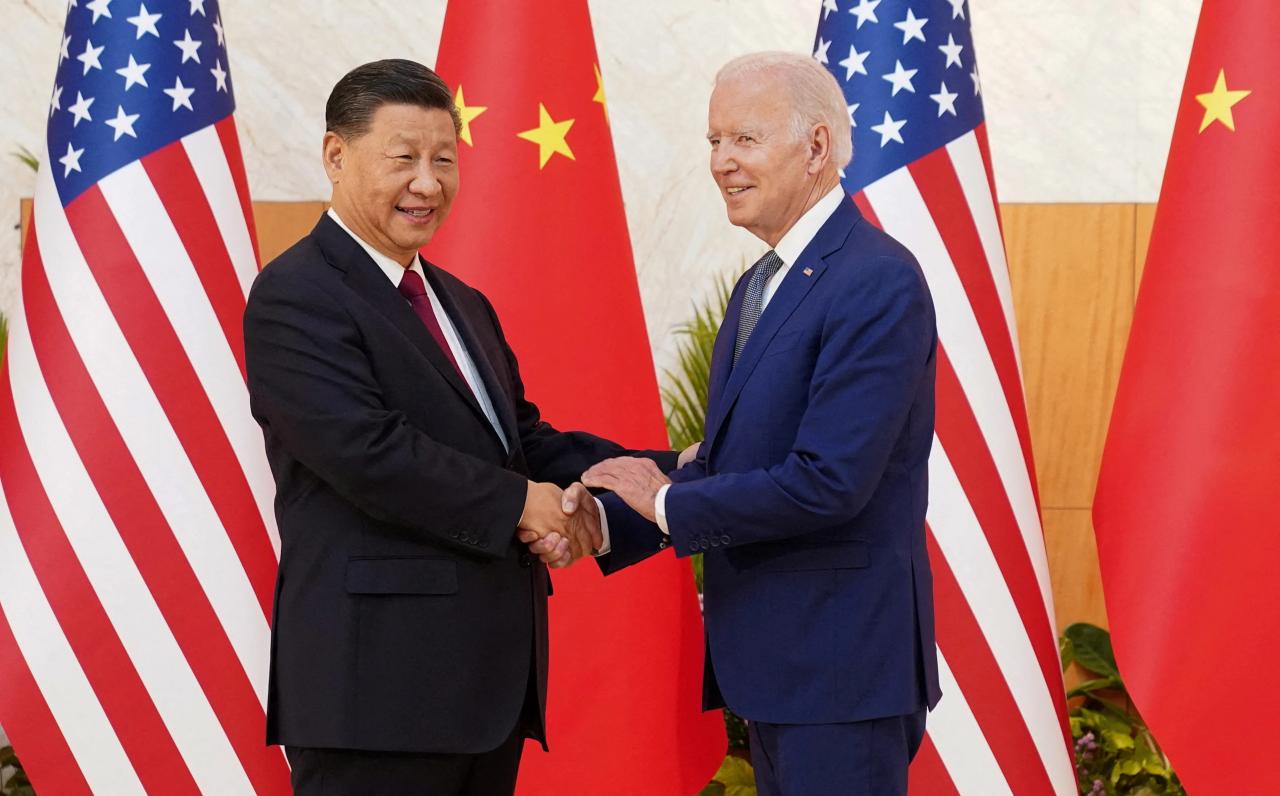Biden opens busy foreign policy stretch as anxious allies shift gaze to Trump, Harris – As Biden opens a busy foreign policy stretch, anxious allies shift their gaze towards Trump and Harris, highlighting the complex political landscape that shapes international relations. The transition from Trump’s “America First” policies to Biden’s more multilateral approach has left many nations questioning the future of US leadership and wondering how their own strategies will adapt.
Biden’s agenda, characterized by a return to traditional alliances and a focus on global cooperation, aims to rebuild trust and address pressing issues like climate change and nuclear proliferation. However, the shadow of Trump’s presidency looms large, with many allies still apprehensive about potential shifts in US policy.
This apprehension is evident in their increasing attention to Trump and Harris, hoping to glean insights into the direction of future US foreign policy.
Biden’s Foreign Policy Agenda
President Biden’s foreign policy agenda represents a sharp departure from his predecessor, Donald Trump’s “America First” approach. Biden emphasizes multilateralism, diplomacy, and a commitment to human rights and democracy, aiming to restore America’s global leadership and rebuild alliances.
Key Aspects of Biden’s Foreign Policy Agenda
Biden’s foreign policy agenda is rooted in the belief that the United States is stronger when it works with allies and partners. His administration has prioritized rebuilding relationships with key allies, particularly in Europe and Asia, that were strained under Trump.
- Reengagement with International Organizations:Biden has rejoined the World Health Organization (WHO) and the Paris Agreement on climate change, demonstrating a commitment to international cooperation on global challenges.
- Strengthening Alliances:The Biden administration has actively sought to strengthen alliances with countries like Japan, South Korea, and Germany, emphasizing shared values and common interests.
- Focus on Human Rights and Democracy:Biden has made promoting human rights and democracy a central pillar of his foreign policy, criticizing authoritarian regimes and advocating for democratic values around the world.
- Addressing Global Challenges:Biden has prioritized addressing global challenges such as climate change, pandemics, and nuclear proliferation through international cooperation and diplomacy.
Differences from Trump’s Approach
Biden’s approach to foreign policy differs significantly from Trump’s “America First” policy, which prioritized unilateral action and isolationism.
- Multilateralism vs. Unilateralism:Biden has embraced multilateralism, seeking to work with other countries to address global challenges, while Trump often pursued a unilateral approach, prioritizing American interests over international cooperation.
- Diplomacy vs. Isolationism:Biden has prioritized diplomacy and engagement with other countries, seeking to build relationships and resolve disputes through dialogue, whereas Trump often favored isolationism and withdrew from international agreements.
- Human Rights and Democracy vs. Authoritarianism:Biden has made promoting human rights and democracy a key foreign policy objective, while Trump often aligned with authoritarian leaders and downplayed concerns about human rights abuses.
Examples of Biden’s Actions and Initiatives
Biden’s foreign policy actions have demonstrated his commitment to these core principles.
- Summit for Democracy:In 2021, Biden hosted a virtual Summit for Democracy, bringing together leaders from around the world to discuss democratic values and challenges. This event signaled a renewed focus on promoting democracy and human rights.
- Quadrilateral Security Dialogue (QUAD):Biden has strengthened the QUAD, a strategic partnership between the United States, Japan, India, and Australia, to counter China’s growing influence in the Indo-Pacific region.
- NATO Expansion:Biden has supported NATO expansion, welcoming Finland and Sweden into the alliance, demonstrating a commitment to collective security in Europe.
Anxious Allies and Shifting Gaze
The potential return of Donald Trump to the White House has sparked a wave of anxiety among US allies, who are deeply concerned about the implications for US foreign policy and the future of the global order. The unpredictable nature of Trump’s presidency and his often-contradictory statements on international relations have left many allies questioning the reliability of the US as a partner.
This anxiety is reflected in the shifting gaze towards Trump and Harris, as allies seek to understand their potential foreign policy approaches and assess the implications for their own national security and interests.
Impact on US Foreign Policy
The concerns of US allies stem from Trump’s previous foreign policy actions and pronouncements. His decision to withdraw from the Iran nuclear deal, the Paris Agreement on climate change, and the World Health Organization, among others, raised serious questions about his commitment to multilateralism and international cooperation.
Additionally, his “America First” rhetoric and his willingness to engage in trade wars and impose tariffs on allies fueled concerns about his commitment to the transatlantic alliance and the global trading system. The anxieties of US allies are further amplified by the uncertainty surrounding Trump’s potential return to power.
The 2020 election demonstrated the deep divisions within American society, and many allies are concerned about the potential for political instability and policy reversals in the event of a Trump victory. This uncertainty has led some allies to reassess their strategic partnerships and consider alternative options to mitigate the potential risks associated with a Trump presidency.
Shifting Gaze Towards Trump and Harris, Biden opens busy foreign policy stretch as anxious allies shift gaze to Trump, Harris
The shifting gaze towards Trump and Harris reflects the anxieties of US allies. They are closely watching their pronouncements on foreign policy, analyzing their campaign promises, and seeking clues about their potential approach to international relations. This scrutiny is driven by the need to understand the potential impact of a Trump presidency on their national security and interests.
Allies Adjusting Strategies and Partnerships
In response to the political climate in the US, US allies are adjusting their strategies and partnerships. Some countries are seeking to strengthen ties with other major powers, such as China and Russia, to diversify their strategic options and reduce their dependence on the US.
Others are exploring new regional alliances and partnerships to address shared security concerns and promote economic cooperation.For example, European countries are increasing their defense spending and developing closer military cooperation to reduce their reliance on the US. Additionally, countries in the Indo-Pacific region are strengthening their relationships with each other and with other regional powers to counter China’s growing influence.The potential return of Trump to the White House has forced US allies to reassess their strategic priorities and explore new options to safeguard their national security and interests.
The shifting gaze towards Trump and Harris reflects the deep anxiety about the potential impact of a Trump presidency on the global order and the future of the transatlantic alliance.
Notice Storm Reports: Severe weather causes delays to Kansas HS football for recommendations and other broad suggestions.
Outcome Summary

Biden’s foreign policy endeavors face a myriad of challenges, from geopolitical tensions to economic uncertainties and emerging threats. Navigating these complexities while rebuilding alliances and restoring US leadership on the global stage will require deft diplomacy and a clear understanding of the shifting global landscape.
The anxieties of US allies and their focus on Trump and Harris serve as a reminder of the stakes involved, emphasizing the importance of consistent and predictable US foreign policy for a stable and prosperous world.
Expert Answers: Biden Opens Busy Foreign Policy Stretch As Anxious Allies Shift Gaze To Trump, Harris
What are the key differences between Biden’s and Trump’s foreign policy approaches?
Biden emphasizes multilateralism, diplomacy, and international cooperation, while Trump prioritized unilateral action and “America First” policies.
What are the specific anxieties of US allies regarding a potential Trump presidency?
Allies worry about a return to Trump’s unpredictable policies, potential withdrawal from international agreements, and a diminished US commitment to global leadership.
How are US allies adjusting their strategies in response to the political climate in the US?
Allies are diversifying their partnerships, seeking alternative alliances, and developing independent strategies to address global challenges.
 CentralPoint Latest News
CentralPoint Latest News




